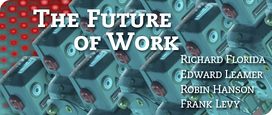In the last two days, everyone has put up interesting posts and Will, the moderator, has sneaked in a few questions of his own. A lot to discuss but I will keep my responses short.
On Ed’s question—what’s to become of Vestal—I am somewhere between Robin and Richard. Ed grew up in Vestal just like I was born in Yonkers—these places (or their memories) have a role in our lives. But a colder eye would say that some of the economic success of these places owed a lot to transient good luck. Some of us here in the MIT city planning department believe that if the Pilgrims had landed in San Diego instead of Plymouth, most of Massachusetts would be a state park. What sane people would have dragged themselves eastward over the Rockies for the pleasure of Massachusetts’ long winters and barren farmland? Instead, the Pilgrims landed in Massachusetts and, given the poor transportation of the time, many locations in western Massachusetts and upstate New York looked pretty attractive. Over time, transportation improved and air conditioning meant the South and West could provide tolerable summers as well as the warm winters. Not so good for the Vestals and the Yonkers of the world.
So I agree with Robin that people do what they do and that people, rather than place, is the dominant issue. But in my experience, if place is to have any chance at a comeback, the situation, as Richard might suggest, starts with the quality of schools. An economist in Boston, Alan Clayton Matthews, knows a great deal about the Massachusetts economy. Some years ago, we were talking about the story that out-of-sight housing prices were strangling economic growth—i.e. there was a housing shortage. Alan said that worrying about the housing stock per se was the wrong way to think about things. Potential residents—the Creative Class?—weren’t looking for just housing. They were looking for housing in communities with good schools. There was plenty of good quality housing stock in communities that were off the table because the school systems were bad. Somehow improve the school system in those communities and the housing shortage would be solved. I am not sure what kinds of industry can be attracted to Vestal in the early 21st century but even if Vestal has good cheap housing (which I assume it does), good schools have to be part of any redevelopment plan. Richard says he is going to get some comments from local officials on the way they are applying his ideas—I would very much like to read those.
Finally, Will, the stealth moderator, asked us to define one government policy that would affect the future of U.S. work. I would nominate some variant of Georgia’s Hope Scholarships and the similar programs that have developed in Arkansas and other states—programs that drastically lower the cost of higher education provided a student performs at or above a specified level. My reasoning comes from three things we know. First, the future of the country depends on human capital formation. Second, the extensive discussion of offshoring, including offshoring higher-end jobs, increases the perceived risk associated with many higher education investments. Third, today’s students increasingly come from minority families where there is no tradition of going to college—a source of information that might reduce the perceived risk. It is not that everyone needs a four year degree but we need to accelerate human capital formation and the cost of post-secondary education is one lever that we have.
Thanks to all of you guys. I have enjoyed this.

